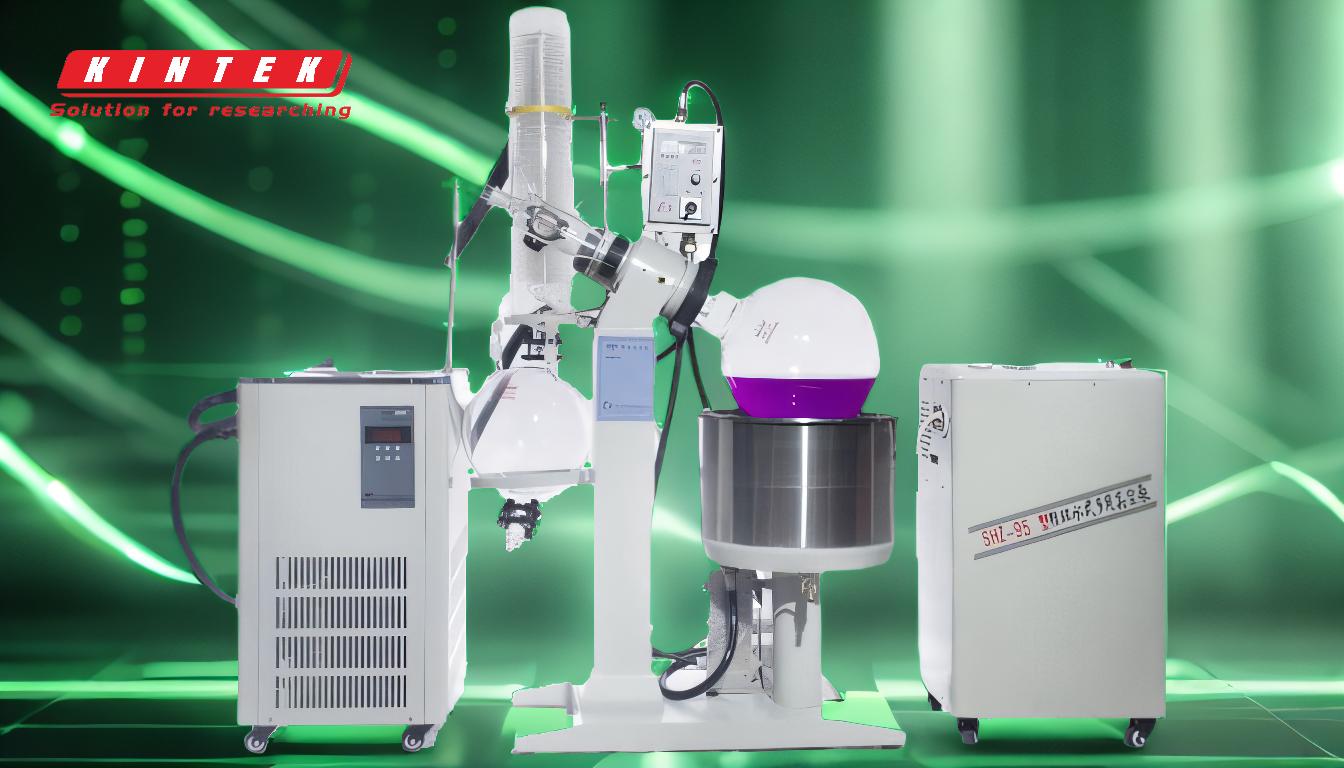A rotary evaporator (rotovap) is a specialized distillation device that operates under reduced pressure (vacuum) to efficiently separate solvents from mixtures. It works by rotating a flask containing the mixture, which increases the surface area for evaporation, while a vacuum lowers the boiling point of the solvent. This allows for gentle and precise separation of solvents at lower temperatures, preventing damage to heat-sensitive compounds. The solvent vapor is condensed by a cooling system and collected in a separate flask, while the desired compound remains in the original flask. Compared to traditional distillation, rotovaps are faster, more efficient, and better suited for delicate or complex mixtures.
Key Points Explained:

-
How a Rotovap Works:
- The rotovap operates under vacuum conditions, which lowers the boiling point of the solvent, enabling evaporation at lower temperatures.
- The flask containing the mixture is rotated, increasing the surface area of the liquid and promoting even heating and mixing.
- Solvent vapor is drawn into a condenser, where it is cooled and condensed back into liquid form, collected in a separate receiving flask.
- The desired compound remains in the original flask, while the solvent is effectively separated.
-
Why Rotovaps Are More Efficient Than Traditional Distillation:
- Lower Temperatures: The vacuum reduces the boiling point of the solvent, minimizing the risk of overheating and preserving delicate compounds.
- Increased Surface Area: Rotation of the flask increases the surface area of the mixture, accelerating the evaporation process.
- Continuous Mixing: The rotation ensures even heating and mixing, leading to a more stable and efficient distillation.
- Precision Control: Rotovaps allow for precise adjustment of temperature, pressure, and rotation speed, optimizing the separation process.
- Solvent Recovery: Nearly 100% of the solvent can be recovered, making it cost-effective and environmentally friendly.
-
Where the Solvent Goes:
- During the distillation process, the solvent evaporates from the mixture due to the reduced pressure and heat.
- The solvent vapor travels through the system and enters the condenser, where it is cooled and condensed back into liquid form.
- The condensed solvent drips into a receiving flask, where it is collected for reuse or disposal.
- The separation of the solvent from the desired compound is clean and efficient, ensuring minimal loss or contamination.
-
Applications and Advantages:
- Preservation of Delicate Compounds: Rotovaps are ideal for separating heat-sensitive compounds, such as flavors, essences, and natural extracts, without altering their properties.
- Removal of Undesirable Elements: They can remove tannins, colors, or bitterness while retaining the full flavor profile of the product.
- Versatility: Suitable for a wide range of applications, including food and beverage production, pharmaceuticals, and chemical research.
- Time and Energy Efficiency: The process is faster and requires less energy compared to traditional distillation methods.
By combining reduced pressure, rotation, and precise temperature control, rotovaps offer a superior method for solvent separation, making them indispensable in industries where efficiency, precision, and preservation of delicate compounds are critical.
Summary Table:
| Key Aspect | Description |
|---|---|
| How It Works | Rotates flask under vacuum, lowers boiling point, condenses solvent for separation. |
| Efficiency Advantages | Lower temperatures, increased surface area, continuous mixing, precise control. |
| Solvent Recovery | Nearly 100% solvent recovery, cost-effective, and environmentally friendly. |
| Applications | Food & beverage, pharmaceuticals, chemical research, preservation of compounds. |
| Key Benefits | Faster, energy-efficient, ideal for heat-sensitive and complex mixtures. |
Discover how a rotary evaporator can optimize your solvent separation process—contact us today for expert advice!










